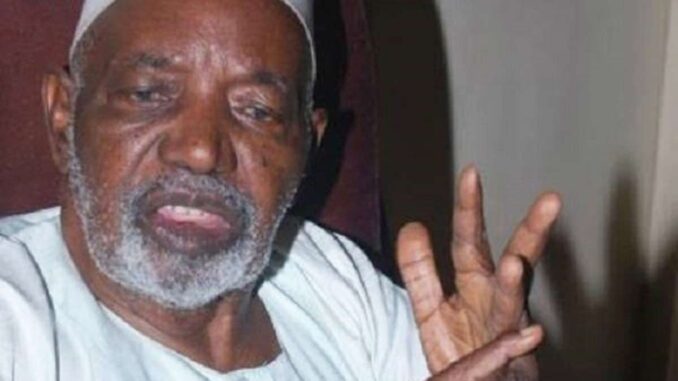
Abdulkadir Balarabe Musa was the first elected governor of old Kaduna State and would be remembered for his rare statesmanship that exuded character, courage, principle and selflessness – all coated in rare simplicity and consistency. His death, on November 11, 2020, at age 84, marks a glaring depletion of Nigerian politicians truly committed to the upliftment of the masses. He will be missed in many ways, not the least as a strident voice for the down-trodden.
Though his stay in public office was short-lived, it never betrayed his patriotism and conviction in a democratic and egalitarian society. He is a hero that is worth emulating by the society and public officeholders. Musa had a remarkable record in the political office space, as the first to be elected governor of Kaduna – a montage of today’s Kaduna and Katsina states – but also as the first governor to be impeached in Nigerian history. He was impeached not on any ground of misconduct or sleaze; but for his unflinching principle.
Born on August 21, 1936 in Kaya, Kaduna State, Musa attended Zaria Middle School from 1947 to 1952. He later went to Institute of Administration, Zaria (1952 – 1953). He worked as Account Clerk between 1953 and 1955 before venturing into teaching from 1955 to 1960. He also worked as an accountant until his retirement in 1975. Between 1960 and 1976, he held many managerial positions in the course of teaching and seeking knowledge. He was elected in the 1979 general elections (Second Republic) on the platform of the People’s Redemption Party (PRP) under the leadership of the radical teacher, the late Malam Aminu Kano.
The narrative of Musa’s impeachment could have been different had he belonged to the crop of today’s largely unprincipled politicians. The then Kaduna State House of Assembly was dominated by members of the opposition National Party of Nigeria (NPN). It was a toxic composition where a government is literally divided along the party line. The NPN majority in the House used every opportunity to frustrate Musa. He was unable to form a cabinet since he refused to nominate NPN members. The House also refused to approve the list of his commissioners and did not pass his budget.
The governor would not bow to opposition, not even to save his head. When the House set up an impeachment panel, Musa did not bother to honour it. He was impeached on June 23, 1981, just nine months into office, thus ending a battle between personal ethics to defend party’s stand versus compromises with opposition to save his tenure as officeholder.
Most present-day politicians would have ditched the party and crossed carpet citing real or imagined internal crises in the party. But Musa was a die-hard party-man and resolute in his convictions. Notwithstanding his brief tenure, Musa set the tone for the development of the modern state of Kaduna through massive infrastructural and other development footprints. He synced the populist ideals of his party, the Peoples Redemption Party (PRP) with a development blueprint influenced by Marxist economics.
He was removed from office but not defeated. His ouster opened a new vista in state activism, but for a better democratic environment as driven by ideology. As an unusual politician and a Talakawa, he was never afraid to go contrary to Malam Aminu Kano, as was the case in the creation of Eagle-PRP from the main PRP. Under Eagle-PRP, he never won any electoral contest and he never bothered or joined the bandwagon. During the Nigerian Fourth Republic he was leader of the Conference of Nigerian Political Parties (CNPP), a coalition of opposition parties focused on putting government on its toes.
He remained an ideologue of Aminu Kano, espousing women right in the conservative male dominated Hausa and Fulani heartland of the old North. Till the end, his life was an open book for all to read. He lived a simple life, riding his old Peugeot car on the streets of Kaduna, with no security escort and lived in his three-bedroom house in Kaduna metropolis, acquired as far back as 1970.
Musa was the rare politician that eludes Nigeria of today. He was a beacon of light in the midst of socio-political darkness. If the majority of the Nigerian political class is like Musa in patriotism, commitment to nationhood, principles and straightforwardness, the country would be a better place for all. Late Musa is a legacy for all on the imperative of loving oneself in self-respect, which is more elegant than popularity among the people.
He demonstrated, more than anything else, that personal gains and material acquisitions are worthless compared to the collective public good that a politician – actually a bird of passage – was able to accomplish. Even if the politician spent a day in office but accomplishes the latter, he or she is forever etched in public memory. Fare thee well, Balarabe Musa.
END

Be the first to comment